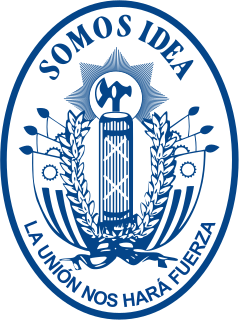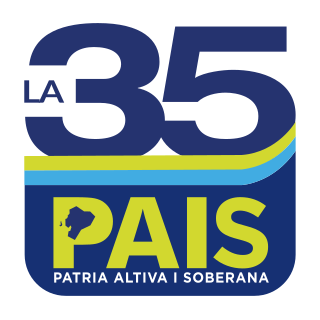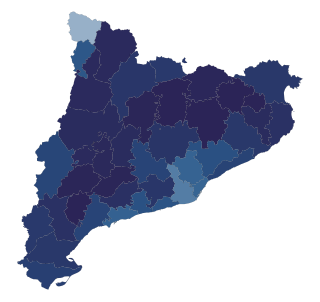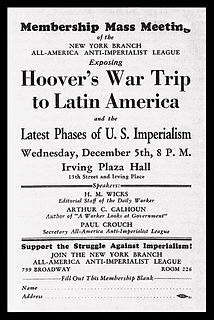
The Galician Nationalist Bloc is a political alliance of left-wing Galician nationalist parties. It is self-defined as a "patriotic front".

Chile holds nationwide presidential, parliamentary, regional and municipal elections.

The Catalan independence movement is a social and political movement which seeks the independence of Catalonia from Spain.

The National Party, also known as the White Party, is a major political party in Uruguay. It was founded in 1836 by Manuel Oribe, making it the country's oldest active political party, and together with the Colorado Party, its origin dates back to the time of the creation of the Uruguayan State.

The Movement of Popular Participation is a Uruguayan political party. It is a member organisation of the left-wing Broad Front coalition.

Oriental Revolutionary Movement is a minor far-left political movement in Uruguay.

PAIS Alliance is a centre-left social democratic political party in Ecuador. In 2016, it had 979,691 members.

The Workers' Left Front – Unity is an alliance of initially three Trotskyist parties in Argentina formed to fight a number of elections in 2011, announced at a press conference in April that year. They are the Workers' Party (PO), the Socialist Workers' Party (PTS), and Socialist Left (IS). In 2019, the Workers' Socialist Movement (MST) joined the alliance.

A non-binding Catalan self-determination referendum, also known as the Citizen Participation Process on the Political Future of Catalonia, was held on Sunday, 9 November 2014, to gauge support on the political future of Catalonia. While also referred to as "Catalan independence referendum", the vote was rebranded as a "participation process" by the Government of Catalonia, after a "non-referendum popular consultation" on the same topic and for the same date had been suspended by the Constitutional Court of Spain.

The 2015 Catalan regional election was held on Sunday, 27 September 2015, electing the 11th Parliament of the autonomous community of Catalonia. All 135 seats in the Parliament were up for election. This was the third regional Catalan election in only five years, after the 2010 and 2012 elections and the first one in over 37 years in which Democratic Convergence of Catalonia (CDC) and Democratic Union of Catalonia (UDC) ran separately, after the dissolution of Convergence and Union (CiU) in June 2015 over disagreements on the coalition's separatist turn.

General elections were held in Bolivia on 12 October 2014, the second to take place under the country's 2009 constitution, and the first supervised by the Plurinational Electoral Organ, a newly created fourth branch of government. Incumbent President Evo Morales was re-elected for a third term.

Popular Unity is a Uruguayan coalition of left-wing and far-left political parties.

The 1981 Galician regional election was held on Tuesday, 20 October 1981, to elect the 1st Parliament of the autonomous community of Galicia. All 71 seats in the Parliament were up for election. The election was held simultaneously with a Statute of Autonomy referendum in Andalusia.

Junts pel Sí was a Catalan electoral, political and parliamentary alliance focused on achieving the independence of Catalonia from Spain. Established ahead of the 2015 Catalan regional election, it was formed by Democratic Convergence of Catalonia (CDC), Republican Left of Catalonia (ERC), Democrats of Catalonia (DC), Left Movement (MES) and Independence Rally (RI.cat), as well as a number of independent personalities from pro-independence sectors of civil society, including the pro-independence organizations Catalan National Assembly, Òmnium and the Association of Municipalities for Independence. The Popular Unity Candidacy (CUP) had been invited to participate in the alliance, but refused to do so and ran on its own instead, citing its disagreement with the presence of politicians in the list.

És el moment, also named as Compromís–Podemos–És el moment, was an electoral alliance formed by Coalició Compromís and Podemos in November 2015 to contest the 2015 Spanish general election in the Valencian Community. United Left of the Valencian Country (EUPV) had also entered talks to enter the coalition, but left after disagreements with Podemos and Compromís. The alliance scored in second place in the Valencian Community in the 2015 election, only behind the People's Party (PP).

The All-America Anti-Imperialist League was an international mass organization of Communist International established in 1925 to organize against American and European commercial expansion and military intervention in Central America, South America, and the Caribbean.
Unidas Podemos, formerly called Unidos Podemos and also known in English as United We Can, is a democratic socialist electoral alliance formed by Podemos, United Left, and other left-wing to far-left parties in May to contest the 2016 Spanish general election. The alliance's official pre-agreement was announced on 9 May 2016 after weeks of negotiations. It re-styled to the feminine form of its name ahead of the April 2019 Spanish general election.
The Unitary Platform is a Venezuelan opposition political alliance made up of civil society, trade unions, retired military personnel, political parties, and deputies of the 2016-2021 National Assembly.
















